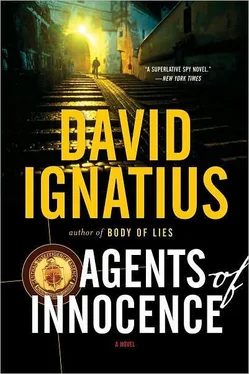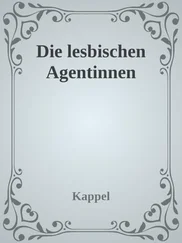David Ignatius - Agents of Innocence
Здесь есть возможность читать онлайн «David Ignatius - Agents of Innocence» весь текст электронной книги совершенно бесплатно (целиком полную версию без сокращений). В некоторых случаях можно слушать аудио, скачать через торрент в формате fb2 и присутствует краткое содержание. Жанр: Шпионский детектив, на английском языке. Описание произведения, (предисловие) а так же отзывы посетителей доступны на портале библиотеки ЛибКат.
- Название:Agents of Innocence
- Автор:
- Жанр:
- Год:неизвестен
- ISBN:нет данных
- Рейтинг книги:3 / 5. Голосов: 1
-
Избранное:Добавить в избранное
- Отзывы:
-
Ваша оценка:
- 60
- 1
- 2
- 3
- 4
- 5
Agents of Innocence: краткое содержание, описание и аннотация
Предлагаем к чтению аннотацию, описание, краткое содержание или предисловие (зависит от того, что написал сам автор книги «Agents of Innocence»). Если вы не нашли необходимую информацию о книге — напишите в комментариях, мы постараемся отыскать её.
Agents of Innocence — читать онлайн бесплатно полную книгу (весь текст) целиком
Ниже представлен текст книги, разбитый по страницам. Система сохранения места последней прочитанной страницы, позволяет с удобством читать онлайн бесплатно книгу «Agents of Innocence», без необходимости каждый раз заново искать на чём Вы остановились. Поставьте закладку, и сможете в любой момент перейти на страницу, на которой закончили чтение.
Интервал:
Закладка:
Aleppo seemed to Levi that morning like the most remote spot on earth. There wasn’t another Jew in 100 miles. Levi felt he had reached the edge of the planet. In the streets he saw the dark faces of Turks, Circassians, Armenians, Kurds. The rough faces of the merchants and nomads and farmers who dwelled in this edge of the world, so very far away from anything else. The morning was quickening. The streets were filling up with people, and the air was fragrant with the smell of bread baking and coffee brewing. An entire city of people Levi had never seen before that day and, God willing, would never see again. He passed an orphanage for Armenian children. My God! he thought. That is the very farthest exile from the garden: to be an Armenian orphan in Aleppo.
Levi walked to the souk, which was about a mile from his hotel. With its maze of narrow alleys and and its many entrances and exits, it was an easy place to spot surveillance, and to get lost. He stopped often, looking for familiar faces. He bought a lacquered wooden box in one of the stalls. After thirty minutes, he was certain that he was clean. There was nobody following him.
He left the souk through a small alleyway and headed for the Crusader castle that overlooked the city of Aleppo. It was a massive pile of stone, gray and forbidding, dominating the city. The castle testified to the peculiar Syrian disinterest in the past. Though a spectacular monument, it was usually deserted.
Levi stopped at the gate, paid his ten piastres to a guard who looked half asleep, and entered the ruins of the fortress. He turned to his left and walked two hundred paces, just as the instructions had said. Then he stopped and looked for a parapet with a chalk mark, which was a sign that the drop had been filled. The chosen mark was a swastika, which seemed to Levi like a sick joke but must have struck someone as good tradecraft.
There was writing on many of the parapets. Arabic names and slogans written right to left, the chiselled names of a few lovers. But no mark. Perhaps he had miscounted the number of paces. The castle was still deserted. Should he start again? Then he saw it. A tiny swastika, drawn with white chalk. There was nobody in sight.
Levi walked exactly twenty-five more paces-strolling, ambling, gazing out over the city the way a tourist would. Then he stopped. He saw it hidden in a crack in the stone, just where the instructions had said it would be. A small brown envelope containing four rolls of microfilm of Syrian military documents, taken by a disgruntled Sunni military officer who believed that he was working for the Turks. Levi looked around. Still nobody. It was too easy. He slipped the envelope into his pocket, turned, and continued his slow stroll around the perimeter of the castle.
Levi returned to the hotel, packed his bags, and checked out. He gave a generous tip to the bellhop, who bowed and called him “Effendi.” He apologized to the owner that he was leaving so soon, but he was due for lunch at the home of a Syrian agribusinessman who lived thirty miles southeast of Aleppo. The Syrian was interested in exporting tomatoes to Europe, and Levi had the contract in his pocket. He relaxed slightly on the road south from Aleppo. One down and three to go.
The second drop was in the village of Sednaya, in the mountains between Homs and Damascus. The village was carved out of the rocky cliffs of the mountains, and in the dry and dusty climate of central Syria, it resembled the cave dwellings of Pueblo Indians in the American Southwest.
The residents of the area were Syriac Christians, an offshot of the Eastern Church. They maintained a convent just outside of the village, which made the village a tourist attraction, at least by Syrian standards. But the true pride and joy of Sednaya was something quite different. The men of the village, fathers and sons, were truck drivers, and they regarded themselves as the finest smugglers in the Arab world. Guns, hashish, whisky, whatever the market required. They knew hidden roads that traversed the peaks of Mount Lebanon, which no customs man had ever seen. They knew tracks in the trackless deserts of Arabia. The men of Sednaya made ideal agents, since they went everywhere and saw everything, but they were also dangerous. A smuggler, after all, is always ready to consider a better offer.
Levi’s agent was supposedly reliable. Ten years on the payroll and never a mistake. Providing purloined military and government documents, unaware that he was working for the Israelis. A man in it purely for the money. A man, thought Levi, who would probably sell his mother for the right price.
The drop was in a wooded area about a mile from the village. Levi approached it very carefully. Careful to avoid surveillance, careful to scout the terrain.
What terrified him, on a run like this, was the possibility that the agent had somehow been caught and turned. That he had been tortured and confessed that on this very day, in this very place, the agent of a foreign intelligence service would be retrieving information that had been left in a hollowed-out log. That at the very moment Levi put his hand into the log to retrieve the packet, a dozen security men would emerge from hiding and arrest him, and take him to a prison where they would torture him, break his bones one by one, until he confessed that he was an Israeli Jew.
Levi felt in his pocket for the tiny metal case that contained the poison tablet. He put it in his hand as he approached the drop. He had no doubt that he would take it if he was captured. That was part of being a coward. Preferring quick and certain death to the excruciating uncertainty of torture.
Levi retrieved the packet. He closed his eyes. There was dead silence. He looked around. Nothing. Empty space. Two down.
Levi was nearing the city center of Damascus when he noticed the traffic lights. Big and bright on nearly every street corner. That was remarkable enough in the Arab world. But the miracle was that the Damascene motorists actually stopped at the lights, yielded at the intersections, gave way to incoming traffic at the circles. Perhaps they were too scared not to obey the traffic regulations.
This was a country, Levi had been told, in which one in ten citizens was an informer for the secret police. It was a nation where the ruling Baath Party instructed the masses at election time with a huge neon sign on a mountain overlooking Damascus. The sign had just one word-“NAM”-the Arabic word for yes. It was a society that lived behind walls, hiding its wealth from public view. The plainest Damascene exterior of stucco and cement could contain a hidden palace decorated in gold and silver. Syria lived by the code of taqiyya- the permissible lie. Its Moslem population was ruled by a sect, the Alawites, who rejected the Prophet Mohammed. Its nominally socialist political leaders were among the most rapacious capitalists in the Middle East. Indeed, the Syrians seemed sincere about only one thing: their hatred of Israel.
Levi stayed overnight in Damascus, in a businessman’s hotel downtown called the New Omayed. It was clean and relatively comfortable. He checked to make sure that the two packets were secure in the false bottom of his briefcase. The case had been beautifully designed. Anyone searching it would have to destroy it to find the false bottom. And any forced entry into this secret compartment would release a vial of acid that would destroy whatever documents had been hidden there.
Levi was hungry. He walked to the diplomatic quarter and dined in an excellent French restaurant called Le Chevalier. He feasted on crevettes, grilled in garlic butter. He drank most of a bottle of wine. He felt relaxed, which made him tense. As he walked home, he could sense the inquisitive eyes watching the foreigner, slightly tipsy, as he walked down the street at midnight.
Читать дальшеИнтервал:
Закладка:
Похожие книги на «Agents of Innocence»
Представляем Вашему вниманию похожие книги на «Agents of Innocence» списком для выбора. Мы отобрали схожую по названию и смыслу литературу в надежде предоставить читателям больше вариантов отыскать новые, интересные, ещё непрочитанные произведения.
Обсуждение, отзывы о книге «Agents of Innocence» и просто собственные мнения читателей. Оставьте ваши комментарии, напишите, что Вы думаете о произведении, его смысле или главных героях. Укажите что конкретно понравилось, а что нет, и почему Вы так считаете.












